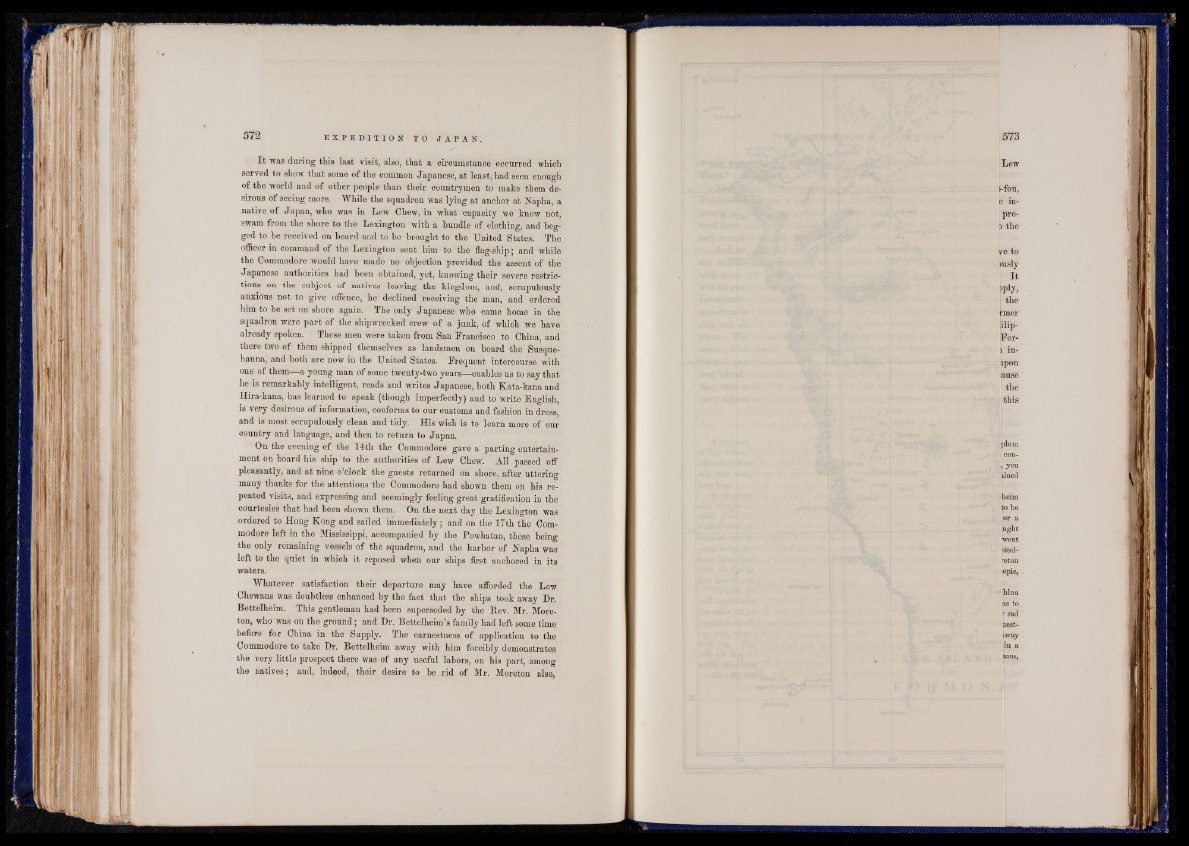
I t was during this last visit, also, that a circumstance occurred which
served to show that some of the common Japanese, at least, had seen enough
of the world and of other people than their countrymen to make them desirous
of seeing more. While the squadron was lying at anchor at Napha, a
native of Japan, who was in Lew Chew, in what capacity we know not,
swam from the shore to the Lexington with a bundle of clothing, and begged
to be received on hoard and to he brought to the United States. The
officer in command of the Lexington sent him to the flag-ship; and while
the Commodore would have made no objection provided the assent of the
Japanese authorities had been obtained, yet, knowing their severe restrictions
on the subject of natives leaving the kingdom, and, scrupulously
anxious not to give offence, he declined receiving the man, and ordered
him to be set on shore again. The only Japanese who came home in the
squadron were part of the shipwrecked crew of a junk, of which we have
already spoken. These men were taken from San Francisco to China, and
there two of them shipped themselves as landsmen on board the Susquehanna,
and both are now in the United States. Frequent intercourse with
one of them—a young man of some twenty-two years—enables us to say that
he is remarkably intelligent, reads and writes Japanese, both Kata-kana and
Hira-kana, has learned to speak (though imperfectly) and to write English,
is very desirous of information, conforms to our customs and fashion in dress,
and is most scrupulously clean and tidy. His wish is to learn more of our
country and language, and then to return to Japan.
On the evening of the 14th the Commodore gave a parting entertainment
on board his ship to the authorities of Lew Chew. All passed off
pleasantly, and at nine o’clock the guests returned on shore, after uttering
many thanks for the attentions the Commodore had shown them on his repeated
visits, and expressing and seemingly feeling great gratification in the
courtesies that had been shown them. On the next day the Lexington was
ordered to Hong Kong and sailed immediately; and on the 17th the Commodore
left in the Mississippi, accompanied by the Powhatan, these being
the only remaining vessels of the squadron, and the harbor of Napha was
left to the quiet in which it reposed when our ships first anchored in its
waters.
Whatever satisfaction their departure may have afforded the Lew
Chewans was doubtless enhanced by the fact that the ships took away Dr.
Bettelheim. This gentleman had been superseded by the Kev. Mr. More-
ton, who was on the ground; and Dr. Bettelheim’s family had left some time
before for China in the Supply. The earnestness of application to the
Commodore to take Dr. Bettelheim away with him forcibly demonstrates
the very little prospect there was of any useful labors, on his part, among
the natives; and, indeed, their desire to be rid of Mr. Moreton also,